- Home
- Gillian Flynn
Dark Places Page 26
Dark Places Read online
Page 26
So what did that mean? Ben wouldn’t kill his family because his little sister found out he had a girlfriend.
I passed a field of cows, standing immobile, and thought about growing up, all the rumors of cattle mutilation, and people swearing it was Devil worshipers. The Devil lurked nearby in our Kansas town, an evil that was as natural and physical as a hillside. Our church hadn’t been too brimstoney, but the preacher had certainly nurtured the idea: The Devil, goat-eyed and bloody, could take over your heart just as easily as Jesus, if you weren’t careful. In every town I lived in, there were always the “Devil kids,” and the “Devil houses,” just like there was always a killer clown driving around in a white van. Everyone knew of some old, vacant warehouse on the edge of town where a stained mattress sat on the floor, bloody from sacrifice. Everyone had a friend of a cousin who had actually seen a sacrifice but was too scared to give details.
I was ten minutes into Oklahoma, a good three hours to go, and I started smelling something overpoweringly sweet but rotten. It stang my eyes, made them water. I had a ridiculous quiver of fear that my Devil-think had summoned the beast. Then in the distance, the churning sky turned the color of a bruise, I saw it. Paper plant.
I turned the radio on scan—station 1, station 2, station 3— blasts of unpleasant noise, static, and ads for cars and more static, so I flipped it right back off.
Just past a sign with a picture of a cowboy—Welcome to Lidger-wood, Oklahoma, Pardner!—I pulled off the ramp and headed into the town, which turned out to be a busted-down tourist trap of a city. It had once fashioned itself as an Old West locale: The main street was all frosted glass and faux-saloons and shoppes. One storefront called itself The Olde Photo Stoppe, a place where families could commission sepia photos of themselves in frontier garb. In the window hung a poster-sized print: the father holding a lasso, trying to look menacing under a hat too big for him; the little girl in a calico dress and bonnet, too young to get the joke; the mother, dressed as a whore, giving an uncomfortable smile, her arms crossed in front of her thighs where her petticoat was slit. Next to the photo hung a For Sale sign. Another matching sign next door at Daphne’s Daffy Taffy, more For Sales at Buffalo Bill’s Amazing Arcade and a storefront with the ridiculous stretch of a name, Wyatt Earp’s Slurpies. The whole place seemed dusty. Even the defunct waterslide loop-de-looping in the distance was plugged with dirt.
Bert Nolan’s Group Home for Men was just three blocks off the downtown drag, a square, low building with a tiny front yard infested with foxtail weeds. I’d always liked foxtail as a kid, it appealed to my literal brain, because it looked like it sounded: a long, thin stem with a length of fuzz at the top, just like a fox’s tail, but green. They grew all over our farm—entire meadows were given over to the stuff. Michelle and Debby and I would break off the tops and tickle each other under our wrists. My mom taught us the colloquial names for everything: lamb’s ear, coxcomb, all those plants that lived up to their titles. A lamb’s ear is as soft as a lamb’s ear. Coxcomb actually looks like a rooster’s red comb. I got out of the car and fluttered my hands across the tops of the foxtail. Maybe I’d grow a garden of weeds. Windmillgrass actually fans out at the top like windmill blades. Queen Ann’s lace is white and frilly. Witchgrass would be appropriate for me. Some devil’s claw.
The door to Bert Nolan’s Group Home was made of metal, painted dark gray like a submarine. It reminded me of the doors in Ben’s prison. I rang the bell and waited. Across the street two teenage boys rode their bikes in lazy, wide circles, interested. I rang the bell again and gave the metal a bang that failed to reverberate inside. I debated asking the guys across the way if anyone was home, just to break the silence. As they were looping closer to me—watcha doing there, lady?—the door opened onto a pixie-sized man in bright white sneakers, ironed jeans, a Western shirt. He jiggled the toothpick in his mouth, not looking at me, flipping through a copy of Cat Fancy magazine.
“Don’t open for the night til …” he trailed off when he saw me. “Oh, sorry honey. We’re a men’s hostel, you have to be a man and over eighteen.”
“I’m looking for my dad,” I said, leaning into my drawl. “Runner Day. Are you the manager?”
“Ha! Manager, accountant, priest, cleaning boy,” he said opening the door. “Recovering alcoholic. Recovering gambler. Recovering deadbeat. Bert Nolan. This is my place. Come in, sweetheart, n’re-mind me of your name.”
He opened the door onto a room full of cots, the strong odor of bleach rising up from the floor. The elfin Bert led me through the rows of thin beds, each one still indented from the night, to an office just his size, just my size, which held one small desk, a file cabinet, and two foldout chairs we sat down on. The fluorescent light was not flattering to his face, which was pocked with dark, dimpled pores.
“I’m not a weirdo, by the way,” he said, flapping the Cat Fancy at me. “I just got a cat, never had one before. Don’t really like her much so far. She was supposed to be good for morale, but so far she just pisses in the beds.”
“I have a cat,” I volunteered, surprising myself with my sudden, intense fondness for Buck. “If they go outside their litter box, it’s usually because they’re angry.”
“That right?”
“Yeah, otherwise, they’re pretty easy pets.”
“Huh,” Bert Nolan said. “Huh. So you’re looking for your daddy? Yeah I remember, we spoke. Day. He’s like most men here— should be happy someone’s looking for them, after the crap they’ve pulled at home. Usually money stuff. Or lack-of-money stuff. No money, too much booze. Does not bring out the best. Runner. Huh.”
“He wrote me a letter, said he was back here.”
“You want to take him home, take care of him?” Bert said. His eyes were black and shiny, like he’d told himself a joke.
“Well, I’m not sure about that. I just want to check in.”
“Ha, good. That was a trick question—people who say they want to find one of my men to take care of them, never do.” Nolan smelled his fingertips. “I don’t smoke anymore, but sometimes my damn fingers still smell like tobacco.”
“Is he here?”
“He’s not. He’s gone again. I don’t allow drinkers here. He just had his third strike.”
“He say where he went?”
“Ah sweetheart, I just don’t give out addresses. Just don’t. Found that was the smartest way to handle all inquiries. But I’ll tell you what, because you seem like a nice lady …”
“Berrrrrt!” came a howl from outside the building.
“Ah, ignore that, just one of my men trying to get in early. That’s another thing you learn to never do: never let anyone in early, ever. And never let anyone in late.”
He had lost his train of thought, he stared at me expectantly.
“So you said you’d tell me what?” I prompted.
“What?”
“How you might help me find my dad?”
“Oh, right. You can leave a letter here with me.”
“Mr. Nolan, I’ve already done that. That’s why I’m here. I really, really need to find him.” I caught myself in the Runner stance, palms on the edge of the table, ready to vault myself up if I got mad.
Nolan picked up a plaster figurine of an old, balding man throwing his arms out in some expression of exasperation, but I couldn’t read the words on the base. Bert seemed to find some consolation in the thing. He let out a sharp sigh between barely parted lips.
“Well, sweetheart, I’ll tell you what, he may not be here, but I know he’s still in Lidgerwood. One of my men saw him just last night outside-a Cooney’s. He’s laying low somewhere, but he’s around. Just prepare yourself for some disappointment.”
“Disappointment about what?”
“Oh, you name it.”
WHEN BERT NOLAN got up to lead me out of his office, he turned his back to me, and I immediately made a grab for his little figurine. But I made myself set it back down, and took his bag of CornNuts and a pencil
instead. Progress. They sat in the car seat next to me as I drove to the nearest bar. Cooney’s.
Cooney’s had not given in to the Old West theme. Cooney’s was proudly crappy in the present day. Three wrinkled faces glared at me as I opened the door. This included the bartender. I ordered a beer, the man snapping that he’d need to see my driver’s license, holding it up to the light and then down near his belly, giving a hmmph, when he couldn’t prove it was fake. I sipped and sat, letting them get used to me being there. Then I spoke. As soon as I hit the word Runner, the place lit up.
“That jackass stole three cases of beer from me,” the bartender said. “Went around back in broad daylight and just took them off the truck. And I’d stood him for a lot of drinks, believe me.”
The middle-aged man two stools down grabbed my arm too hard and said, “Your goddam daddy owes me two hundred bucks. And I want my lawn mower back. You tell him I’m looking for him.”
“I know where you can find him,” said an old guy with a Hemingway beard and the build of a girl.
“Where?” everyone else said at once.
“Bet anything he’s living with the rest of them squatters, camped out over at the Superfund site. You should see it,” he added more to the bartender than me, “it’s like a old-time Hooverville, bonfires and shanties.”
“Why the hell would anyone live at the Superfund site?” the bartender snapped.
“Well, you know no one from the government will show up.”
They all laughed angrily.
“Is it even safe to go there?” I asked. I pictured toxic waste barrels and lime-green sludge.
“Sure, if you don’t drink the well water and you’re not a grasshopper.”
I raised my eyebrows.
“That’s what it’s from: the whole site is soaked with arsenic. It’s an old dumping spot for grasshopper bait.”
“And shitheads,” said the bartender.
Ben Day
JANUARY 2, 1985
8:38 P.M.
They drove toward town, snow starting to fall, Ben just remembering he left his bike back at the warehouse and now that was probably gone. “Hey,” he yelled up front—Trey and Diondra were talking, but he couldn’t hear them over the music screeching on the radio, like ripped sheets of metal, Weeeeeeeer-weer-weer-weer. “Could we stop by the Compound real quick so I can grab my bike?”
Trey and Diondra exchanged looks.
“No,” Diondra busted out a grin, and they started laughing. Ben sat back for a second, then leaned back up. “I’m serious, I need it.”
“Forget it, dude. It’s gone,” Trey said. “You can’t leave shit at the Compound.”
They drove onto Bulhardt Avenue, the main strip in town, where nothing was happening, as usual. The hamburger joint was a bright yellow diorama featuring a few jocks and their dates, all draped over each other. The stores were black, and even the bar looked barely open—only a vague light could be seen in the single rectangle of window in the front. The door itself had been painted navy and revealed nothing.
They parked right out front, Diondra still finishing her beer, Trey grabbing it from her and drinking the rest—the baby won’t mind. On the sidewalk, some old guy, his face a confusion of wrinkles, his nose and mouth looking like they were molded out of a twist of clay, scowled at them once and walked into the bar.
“Let’s do it,” Trey said, and started to get out of the truck. And then when he saw Ben hesitate, still sitting in back, his hands on his knees, Trey stuck his head back in the car and smiled that businesslike smile: “Don’t worry, dude, you’re with me. I do a lot of drinking in there. And—heh!—you’re pretty much visiting your dad at the office.”
Diondra fingered the edges of her crunchy curls, her version of running her fingers through it, and they both followed Trey inside, Diondra with her lips pouty and her eyes sexy-sleepy, the way she looked in most photos, like you woke her up from a dream about you. Next to her, Ben feeling gangly and droopy as usual, literally dragging his feet.
The bar was so smoky Ben choked as soon as he entered, Diondra already with a cigarette lit, slouching next to him as if that made her look older. A nervous guy, his hair in patches like a molting bird, scurried up to Trey immediately, his head lowered, and muttered something in Trey’s ear, Trey nodding, sucking his lips in against his teeth, looking concerned and serious. Ben thought maybe the guy was a manager, was kicking them out, because maybe Diondra passed for older with the extra makeup but Ben didn’t. But Trey just patted the guy on the back, saying something like, “Don’t make me chase, man,” and the nervous guy got a big grin and laughed and said “No no no, don’t worry about that, don’t worry about that at all, not at all” and Trey just said, “Sunday” and walked past the guy to the bar, ordered three beers and a shot of SoCo, which he swallowed straight off.
The bartender was another old, gray-haired fat guy. It seemed like a joke, how much all these dudes looked alike, like living was so hard it just erased your features, rubbed out anything distinctive. The bartender gave Ben and Diondra a wise-guy look, a just-so-you-know, I-know look, but slid them two beers anyway. Ben turned away from the bar to drink his, one foot against a stool, in a way that felt casual, like he’d done it before, because he could feel Trey’s eyes on him, looking for something to make fun of.
“I see him, I see Runner,” Diondra said, and before Ben could ask her why she sounded so easy saying his name, Trey was calling it out, “Hey Runner, c’mere!” and Runner got the same nervous, weasel look the first guy had.
He came loping over, that seesaw walk of his, his hands jammed in his pockets, his eyes big and yellow.
“I just don’t have it, man, I just don’t. Tried to scrape it up earlier, but I just, I was going to come try to find you, I just got here myself, I can give you the last of my weed in the meantime—”
“You want to say hi to Diondra?” Trey interrupted.
Runner started, then smiled. “Oh, hey Diondra, hehheh, wow I must be drunk, oblivious!” He pretended to close one eye so he could see better, made a little jump on the tips of his toes. “Heh, yeah drinking myself cross-eyed because I’m so freaked out about this situation.”
“Runner, you want to look at who’s next to Diondra?” Ben had barely turned to face him, he was trying to think of something to say besides, Hey Dad, but he couldn’t so he just stood there, waiting for the inevitable shittiness to happen.
Runner peered through the dimness of the bar and didn’t recognize Ben.
“Hi … there,” he said, and then to Trey, “That your cousin? I can’t see too well, night vision, I need contacts but—”
“Oh my God,” Trey said leaning back to pretend to laugh but looking enraged. “Take another look, asshole.” Ben wasn’t sure if he was supposed to display himself better, like some girl hoping to scam. Instead he stood rigid, staring at his dark flop of hair in an old Schlitz mirror on the far wall, as he watched Runner sidle up to him, reaching a hand out toward him fairy-tale-like, as if Runner were a troll and Ben some awful treasure. He kept getting closer, stumbling on Ben’s foot, and then they made eye contact and Runner yelped, “Ohhhh!” and seemed even more nervous. “Hair’s not red.”
“You remember your son, right, this is your son, isn’t it, Runner?”
“It is, my son! Hey Ben. No one can blame me for that one, hair’s not red. I didn’t even know you knew Trey.”
Ben shrugged, watching Runner’s reflection back away from him in the mirror. He wondered how much Runner owed to Trey, why Ben felt like some ransom victim, not that Runner would actually care if he was up for ransom. He wondered too, how accidental this visit was. It had seemed like spur of the moment, but Ben was guessing now that they were always going to end up here tonight.
“I don’t get it, Runner,” Trey continued, talking one notch above the country music. “You say you don’t have any money, Ben here says you don’t have any money, and yet, you had that giant stash of weed just a few weeks ago.�
�
“Wun’t good weed though.” He turned his shoulder toward Trey, cutting Ben out of the conversation, shooting backward glances at him, trying to push Trey toward the center of the room by standing closer and closer to him, Trey not moving, finally saying, “Get off me, man,” and Runner settling back on his heels.
“Nah, nah man you’re right, it wasn’t good stuff,” Trey continued. “But you were charging like it was.”
“I never charged you nothing, you know.”
“You didn’t charge me because you owe me, dipshit. But I know for a fact you were charging $20 for a dimebag, now where the fuck is the money, you give it to your wife to hold?”
“Ex! Ex-wife,” Runner yelled. And then: “I was trying to get money from her, not give it. I know she’s got money there, even when we were married, she’d hide money, rolls of it, hundreds, from the harvest sales, and stick it in funny places. Found $200 in the foot of her pantyhose one time. Maybe I should go back.” He looked over at Ben, who was listening but trying to pretend he was teasing Diondra, his finger twirling Diondra’s hair, Diondra only partly playing along.
“Can I talk to you about the situation over there in private?” Runner pointed over to a corner where three tugboat-sized men were playing pool. The tallest, a pale, white-haired old guy with a Marine tattoo, propped his pool cue up and puffed his chest out at them.
“Right,” Trey said.
“You can talk in front of me,” Ben said, trying to sound like he didn’t care.
“Your son needs money from you, just like I do,” Trey said. “Maybe worse than I do.”
Runner turned from a shriveled position under Trey’s black-lamp eyes, and headed back over to Ben, raising himself to full height. Somewhere since summer Ben had grown. He was just a little bigger than Runner now, 5’5”, 5’6”.
“You owe Trey money? Your mom said you’uz in trouble. You owe Trey?” he blasted at Ben, his breath yellow—beer and tobacco and maybe a mustardy tuna salad. Ben’s stomach grumbled.

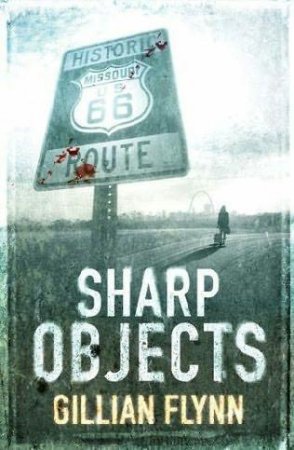 Sharp Objects
Sharp Objects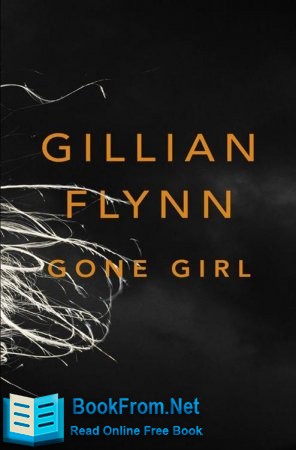 Gone Girl
Gone Girl Dark Places
Dark Places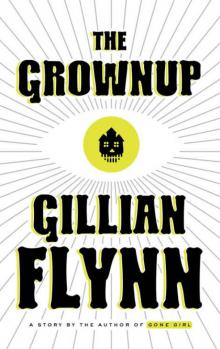 The Grownup
The Grownup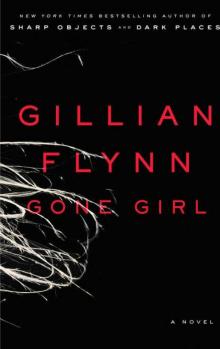 Gone Girl: A Novel
Gone Girl: A Novel The Complete Gillian Flynn
The Complete Gillian Flynn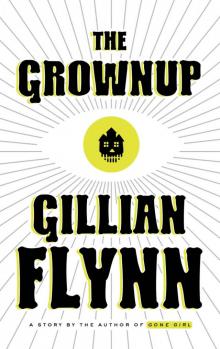 The Grownup: A Story by the Author of Gone Girl (Kindle Single)
The Grownup: A Story by the Author of Gone Girl (Kindle Single)